Hiking isn’t just fun, challenging, and rewarding — it’s also scientifically proven to be great for your physical and mental health. However, all novelties eventually wear off. As you build experience and confidence, you start looking for a bigger and better challenge.
Enter night hiking. Walking at night isn’t just hiking when the sun’s no longer out. You’ll have to jump through new hurdles and consider new factors to create an enjoyable and safe experience. That’s what this guide is all about — equipping you with the know-how you need to survive and have a great adventure.
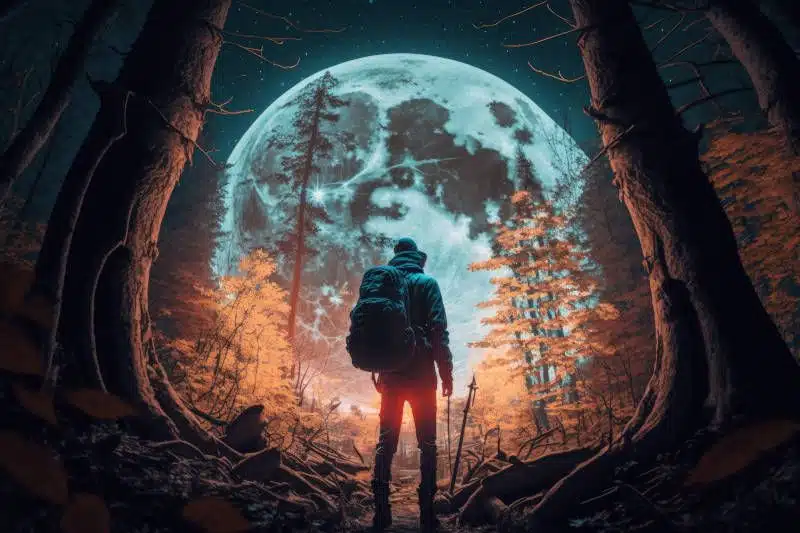
We will cover the following:
- Essential safety tips for new night hikers.
- The pros and cons of walking at night.
- How to get yourself ready — mind, body, and soul.
- What to consider to make your first night hike an especially memorable one.
Getting Started with Night Hiking: Essential Tips for Beginners
Night hiking isn’t for the faint of heart. Never convince yourself you’re experienced enough to skip essential safety steps, especially on your first try. Always keep these important safety tips in mind before you even think about night hiking.
Choose the Right Trail for Your Night Hike
Novice night hikers should stick to familiar terrain — and ideally close to home. Everything looks different when you are walking at night, so it really helps to know the area you’re hiking in like the back of your hand.
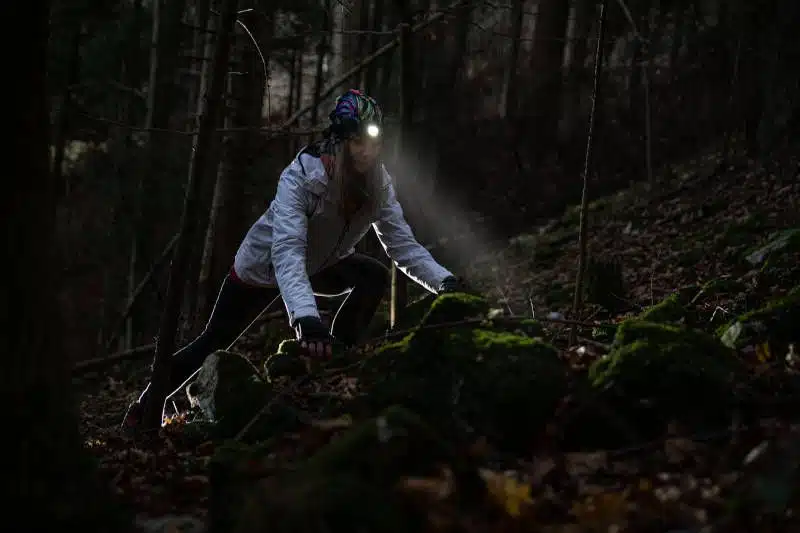
Even when hiking far from home, always pick a trail you have already walked during the day. It’s wise to stick to one of the easier trails in your chosen national park or nature reserve, even if you are already an experienced hiker. That means no steep hills, rocky terrain, cliffs, or canyons. It also means picking a shorter trail.
Plan Thoroughly
Remember that being forewarned is being forearmed. Walk the trail you’re planning for your night hike in advance and assess the conditions carefully, watching for anything that could get in your way. Take notes.
Lighting the Way
Hiking at night will confront you with darkness by definition. Ensuring you have the right equipment is critical.
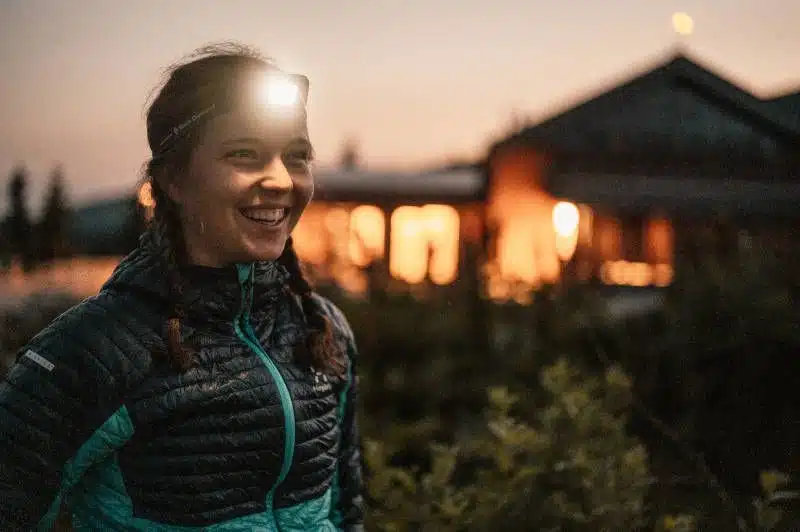
You will need the following:
- A high-quality, bright flashlight with more than one set of spare batteries (because Murphy’s Law says that when you need batteries the most, they never work). Test the battery life beforehand, and don’t rely on the manufacturer’s claims.
- A headlight. Being hands-free is one of your top priorities. Quality headlights with red lights help you see in the dark without interfering with your night vision. You don’t need a fancy model with lots of settings, but you do need your headlight to be reliable and robust. The extra battery rule holds true here, too.
- A clear sky and a bright moon. Watch the weather forecast and the lunar cycle like a hawk, and plan your first night hike on a (nearly) cloud-free day when the moon is close to full.
Safety in Numbers
The idea of walking at night on your own, surrounded by nothing but the great outdoors and your awe of nature, is a powerful one. It’s also a silly one, especially if this is your first night hike and safety is (as it should be) your top priority.
Choose people you trust to accompany you on your first night hike. You’re not just looking for reasonably experienced hikers but also for responsible folks who won’t ignore basic safety rules. You’ll be better off for it, and you’ll build skill and confidence for your first solo night hike.
Whether or not you take this advice, always let someone know where you’re going and when you expect to return, giving your “emergency backup” a copy of your planned itinerary. That way, if something goes awry, you’ll know the emergency services will be looking for you.
Emergency Gear
In case you get lost or get into trouble, strongly consider bringing the following items on your night hike:
- Your cell phone — while being mindful that you may not have reception.
- A satellite emergency beacon.
- A flare gun.
- Water purification tablets (or another system) and MREs.
- A means of making an emergency shelter.
- A first-aid kit stocked to meet your needs.
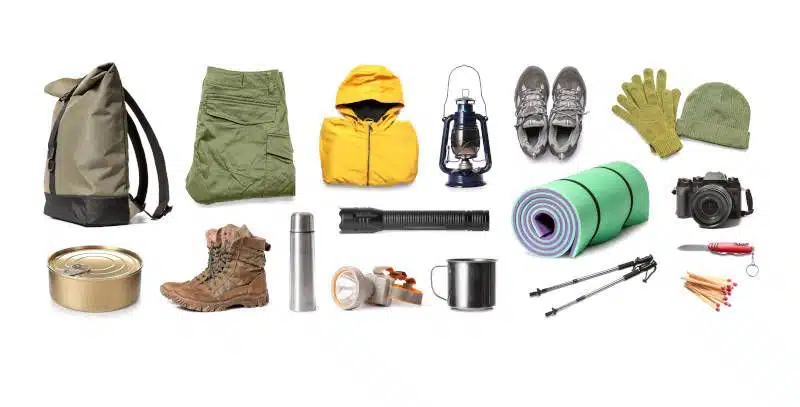
Bring the Right Clothing
No matter where you plan to walk at night, it will always be colder than you expect it to be. Temperatures can drop rapidly when day turns to night — and a drop of 10 to 20 degrees Fahrenheit (five to 10 degrees Celsius) isn’t uncommon.
Bring extra layers. You’ll need them. It’s helpful if your extra layers can be compact, fitting into your backpack neatly, but don’t skimp even if you’re low on space. A windbreaker rain jacket is essential, but you may also consider a thermal Mylar blanket.
Remember the Trekking Poles
Even if you don’t use trekking poles for day hikes, you’ll want them when walking at night. The terrain will look and feel different, and it will be easy to lose your balance. Don’t let that happen to you, and remember that trekking poles can help you navigate low-visibility terrain better, too.
Situational Awareness
Hiking at night safely requires all your senses. Remember these tips to boost your situational awareness in mind:
- Don’t wear headphones.
- Only use your smartphone if you absolutely need to.
- If you’re hiking with a group, don’t talk loudly, and don’t spend too much time talking while walking in general. Use all your senses to listen to the environment, especially in areas with dangerous wildlife.
- Don’t just use your ears, but also your sensory perception (feel the terrain under your feet as you walk) and your sense of smell. Be mindful of every step.
- Don’t stray away from your group.
- Take regular breaks.
- Pay attention to your intuition. If something feels off, it probably is.
What Makes Walking at Night Awesome and What to Watch Out For
Walking at night can be daunting, but going for a night hike also offers fantastic rewards. Let the adventures that await you inspire you to plan a safe and rewarding night hike!
Cooler Temperatures
Some hikers struggle in extreme summer temperatures, but walking at night allows you to enjoy significantly cooler temperatures. A night hike during a hot summer can help you avoid the risks of heat exhaustion and sunburn.
Fewer People
Have you ever felt that the nature you were supposed to enjoy wasn’t untouched enough because there are so many people everywhere, all the time? A night hike is the perfect solution. Your chances of not encountering any humans outside your hiking group are very high. Night hikes allow you to see nature the way it’s meant to be — humans not included.
Stargazing Opportunities
If you’re taking our advice to walk on a clear night with a bright moon, you’ll have the opportunity to see what the stars look like without the light pollution you’ll encounter in any urban environment. Enjoy it, and bring a stargazing map, too.
Nocturnal Animals
Hiking at night also gives you a chance to spot some nocturnal animals that you’d never come across during the day. Your options will vary from region to region. Still, as long as all your senses are open, your odds of being pleasantly surprised are good.
The Sunrise
Strategically planning your night hike so you’ll be able to see the sunrise will give you an unforgettable experience that few people can lay claim to. Enjoy the moment, or try to capture it on camera!
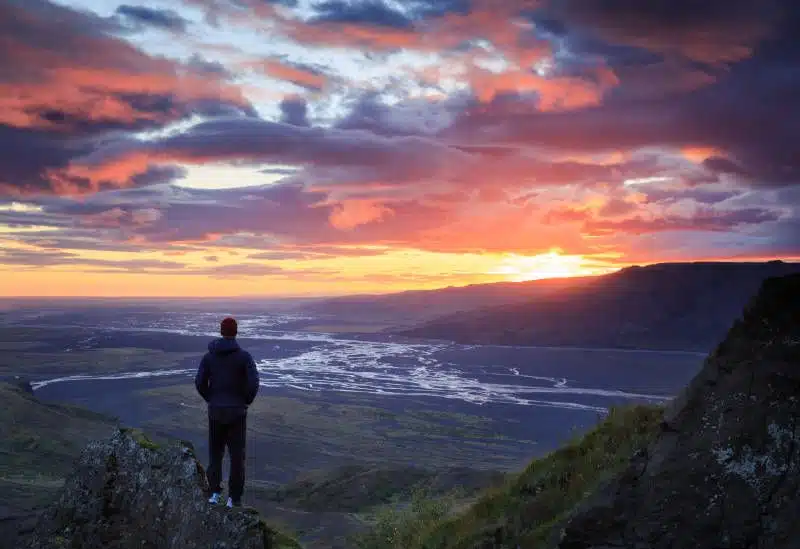
The Cons
Night hiking is fantastic, but every pro comes with a con — and your adventure is no different.
Because you won’t be able to see the terrain as well as you would during the day, you’ll have to walk more slowly and cautiously when walking at night. This means you’ll cover less ground, which can be disappointing for someone hoping to go long distances.
The nightly landscape also looks completely different. You’ll see many fascinating and exciting things if you’re committed to keeping your eyes peeled — ranging from massive (think the Milky Way galaxy!) to tiny (beautiful moths). You will, however, inevitably miss out on the view and the colors you’d see during the day.
Furthermore, you’re more likely to get lost, fall, become injured, or get into trouble with animals, bears or other people (especially hunters, who are often active in the dark, but also insensitive tourists) while hiking at night. Preparedness can help you stay safe, but night hikers should be aware of the scary fact that falls and related injuries that occur at night are a prime cause of hiker deaths.
The more dangerous the terrain is, the more risky your night hike becomes. Factors like ice, rivers and streams, dangerous wildlife, and sudden extreme weather (heavy rain, hailstorms, thunder, blizzards) can instantly turn your dream into a nightmare. That’s especially true if you’re less careful than you should be — hence the need to drill basic safety rules into your mind before you ever attempt walking at night.
The Verdict
Cons like missing out on the view, the colors, and the wildlife active during the day are easily remedied. You can also walk the same trail during the day, which we’d recommend for safety reasons.
However, night hiking does bring dangers that walking during the day doesn’t. They include low visibility, wildlife, extreme weather, and treacherous terrain. All these factors essentially boil down to the risk of getting lost, injury, and death. Careful planning and experience as a daytime hiker can help you mitigate these risks. So can common sense.
Night hiking gives you opportunities you’d never have access to during the day, from feeling one with nature and enjoying quiet contemplating to looking to the stars and watching the sunrise. It’s worth it — but only if you come prepared.
How to Prepare for Your First Night Hike: Mind, Body, and Soul
As with every new adventure, it’s best to go on a night hike as fully prepared as possible. Physical preparedness is essential, as you’ll already know as a hiker, and we’ll assume you’re physiologically ready for the trail you plan to walk at night. We’ll also assume that your hiking boots are broken in and that you have a basic idea of what you’re doing.
A quick refresher is always good, though, so take these physical and mental preparedness factors into account to enjoy a safe and meaningful night hike!
Be Optimistic
You’ve prepared. You have the right gear. You know the terrain and the trail. You have an emergency contact, and you’ve left instructions for a trusted person to contact the emergency services if you go missing.
You’ve got this. You can do it. The first time is always a little scary, but you’re as ready as you can be. Acknowledge that.
Be Realistic
No matter how much daytime hiking experience you already have under your belt, walking at night is an entirely different experience. Understand that going in. The terrain may feel a little alien, even if you’re familiar with it, and you won’t be able to see as much. Err on the side of caution because your safety matters.
Stay Focused
Night hiking requires more situational awareness than hiking. You can’t afford to daydream (OK, “night-dream”) or relax. Stay focused every step of the way, and we do mean that quite literally!
Allow Your Eyes to Adjust
Spend some time at the starting point, simply allowing your eyes to adjust to the dark night sky before you set off on your hike. Don’t use your flashlight or headlight, and put your electronic devices away after letting your emergency contact know you’re about to start your hike.
Rely on Your Team
If you’re hiking with a group, you should be able to rely on each other and work as a team. You can assign each member of your group a specific responsibility, as well as ensuring each person remains alert at all times.
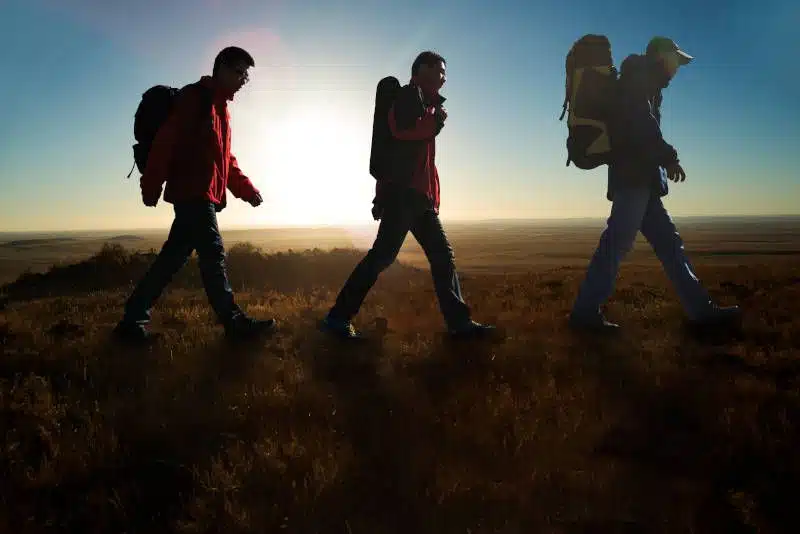
Take Breaks
Even a shorter, 10 or 15 mile hike can feel much longer when you’re walking at night. Make sure to take rest periods every so often. Even better, plan the best locations for breaks ahead of time. Remember to have a snack if it’s a longer hike.
Stay Hydrated
A night hike allows you to escape the extreme summer heat. However, regardless of the conditions and temperatures you are hiking in, you’ll still need hydration. Make sure you have plenty of water, as well as means to create clean water through filtration in an emergency. But above all, make sure you use the water you have.
Breaks are a great time to hydrate, but if you’re hiking with a group, you can assign one member the role of reminding everyone else to drink water occasionally.
Be Flexible
Nothing ever goes quite according to plan, does it? Remember that as you prepare for your first night hiking adventure, and accept it fully by being adaptable.
Don’t be afraid to turn back if you’re met with an obstacle you’re not sure you can overcome, and take your intuition seriously. Intuition is, after all, just the “animal part of the brain” — the part that helps you stay alive when conscious logic fails. If you’re worried you can’t do it, don’t tell yourself to be brave. Turn back and try again another time.
Making the Most of Your Night Hike: Some Tips
Everyone takes a different approach to night hiking. Some crave the experience of being fully present in the moment, for example, content to have memories to treasure. Others would like to remember the experience of walking at night more tangibly.
If you’re planning to create tangible reminders, try the following:
- Bring your photography equipment to capture the stars and the nighttime sky.
- Watch the sunrise and photograph it.
- Capture the experience of hiking at night with your group.
On the other hand, if you want to let go entirely and truly experience the moment, try:
- Ensure each group member can spend some time alone with nature without being interrupted by talking or laughter.
- Listen for sounds you’ve never heard before in the quiet night.
- Watch every moment of the sunrise.
- Enjoy the bonds you forge with your fellow hikers during this unique experience.
This is your experience — and hopefully, the first of many. Make sure it’s a good one, and plan for a night hike that aligns with your personal goals.
Hiking at Night: Some Final Words
Nothing is a substitute for experience, but we all have to start somewhere.
This guide covered the essential points first-time night hikers with daytime experience need to consider before they set off on a new adventure. From here, it’s all up to you. Rely on all the skills you’ve built so far to make your night hike a success and keep your feet firmly on the ground at all times!




